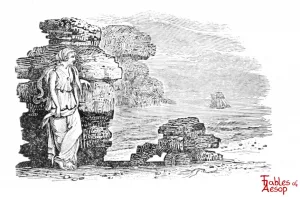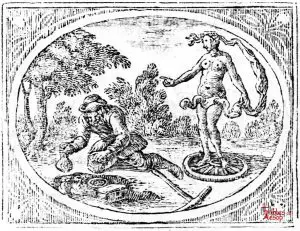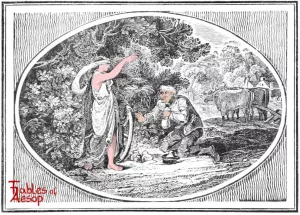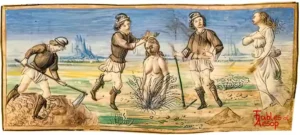A Countryman found treasure and gave thanks to the ground. Fortune came asking why he thanked the ground when Fortune would have been otherwise blamed.
Everyone is more or less master of his own fate.
[Note: Also, see the similar fable The Traveler and Fortune.]

JBR Collection
As a Countryman was one day turning up the ground with his plough, he came across a great store of treasure. Transported with joy, he fell upon the earth and thanked her for her kindness and liberality. Fortune appeared, and said to him, “You thank the ground thus warmly, and never think of me. If, instead of finding this treasure, you had lost it, I should have been the first you would have blamed.”

Samuel Croxall
THE Plowman, as he was plowing the ground, found a treasure. Transported with joy he, immediately began to return thanks to the ground, which had been so liberal and kind to him. Fortune observed what he did, and could not forbear discovering her resentment of it. She instantly appeared to him, and, You fool, says she, what a blockhead are you to lie thanking the ground thus, and take no notice of me! You sot, you; if you had lost such a treasure, instead of finding it, I should have been the first you would have laid the blame upon.
THE APPLICATION
If our affairs succeed and go well, we ought to let them have the credit of it, to whose interest it is chiefly owing, and whom upon any miscarriage, or ill management, we should have found fault with. That just rule of equity, to do as we would be done unto, should, as near as we can, be observed in every action of our lives. But vanity and peevishness dispose us too often to break it; one makes us ascribe that to our own good address, which perhaps is owing to some accident; the other puts us upon charging Fortune, or somebody besides ourselves, with that ill success, for which we may probably be indebted to our own stupidity and negligence only. What titles of honour, what stations of dignity, what places of profit in church and state, are now and then possessed by dull, useless wretches! who never once dreamt that they were obliged to Fortune alone for their happines in obtaining them! Yet, if the case were quite otherwise, and these creatures left low and undistinguished as their own merit, it is ten to one but they would have cursed their stars, fretted at their ill luck, and stormed at the barbarous treatment of their capricious fortune.

Thomas Bewick (The Ploughman and Fortune)
As a Ploughman was turning up the soil, his plough uncovered a treasure which had been hidden there. Transported with joy, he seized upon it, and fervently began to thank the ground for being so liberal to him. Fortune passing by, observed what he was about, and could not forbear shewing; her resentment at it. You stupid creature, said she, to lie thus thanking the ground, and take no notice of me! If you had lost such a treasure, instead of finding one, I should have been the first you would have laid the blame upon.
APPLICATION.
How often do we ascribe our success or misfortunes to wrong causes! Vanity sometimes leads us to consider our prosperity as the natural result of our own sagacity, and inattention sometimes induces us to make acknowledgments to wrong persons. But if we would have our praises valued, we should be cautious to direct them properly. Our thanks are an indirect affront to those who receive them without deserving them; and at the same time an act of open ingratitude to those who merit them without receiving them. In prosperity, as well as in adversity, let us not forget the power and goodness of Heaven; and if we implore the aid of the Almighty in our distress, we should not neglect to send up our acknowledgments of his goodness with the voice of gratitude.


Gherardo Image from 1480
Perry: 061


